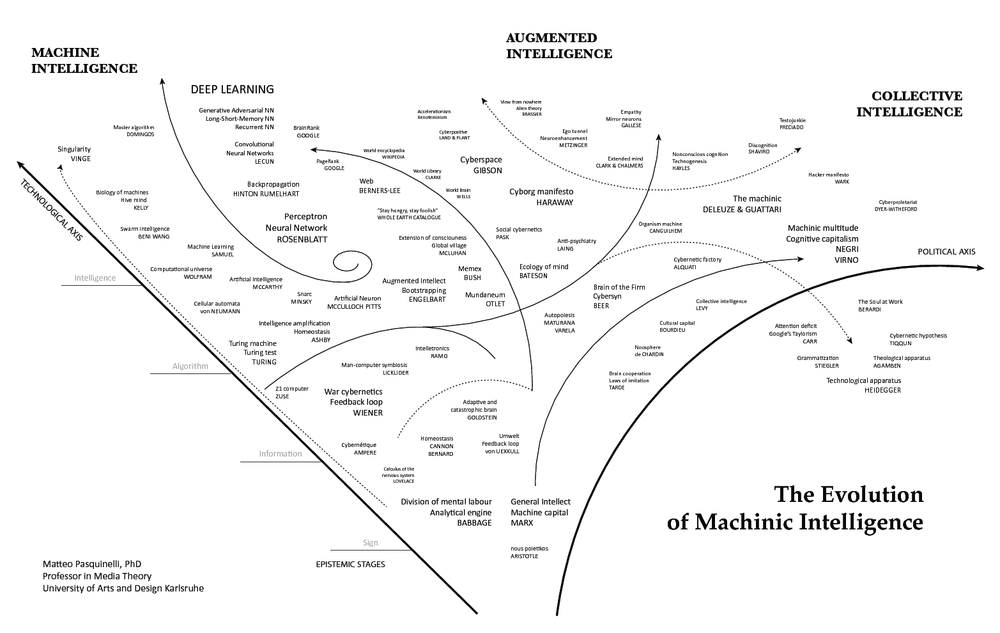User:Tancre/readings/Pasquinelli on augmented intelligence
Pasquinelli - Augmented intelligence
Augmented intelligence is an umbrella-term used in media theory, cognitive sciences, neurosciences, philosophy of mind and political philosophy to cover the complex relation between human intelligence, on one side, and mnemotechniques and computational machines, on the other, both understood as an expansion (also to a social and political degree) of human cognitive faculties.
Main Synonyms
Extended mind, extended cognition, externalism, distributed cognition, social brain. From cognitive science and philosophy but not only with technology.
Virtual reality, augmented reality and teleoperation. For their influence on cognition.
Brain-computer interfaces, the exo-self and the exo-body.
It is different from AI (implies autonomy of the machine intelligence) and swarm intelligence (decentralized and spontaneous forms of organization in animals, humans, bots).
Nootropics > drugs that improve mental functions such as memory, motivation and attention.
History
- Babbage - Division of mental labour (1832)> Relation cognitive faculties/labout/computation
- Engelbart - augmented human intellect: a conceptual framework (1962)
- Bush - memex (1945)
- Ashby - intelligence amplification (1956)
- Licklider - man-computer symbiosis (1960)
- Ramo - intelletronics (1961)
From Engelbart methodology called 'bootstrapping', political and progressive vision. Any form of augmented individual intelligence immediatley lead to the collective and political intelligence.
Conceptual Axes of Augmentation
- technological axis > any technique of external memory as extension of human cognition. McLuhan innovations in media causes expansion of our senses affecting cognition and social organization. After McLuhan 4 epistemic periods: sign/information/algorithm/intelligence. Interaction between human mind and techniques of augmentation is recursive. AI hypothesis (Turing) trivially as autonomous machine, more interestingly, as alliance between the two forms of cognition. (vinge 1993 - technological singularity / chalmers 2010 - intelligence explosion).
- political axis > political consequences as soon as a large scale of computation and interactions are reached. Collective intellect as autonomous agent (not necessarily in the technological apparatus)
- marx - general intellect
- de chardin - noosphere
- vygotsky - extra-cortical organisation
- wells - world brain
- bourdieau - cultural capital
- virno - mass intellectuality (autonomism)
- lecy - collective intelligence
Deleuze and Guattari's notion of the machinic (inspired by Simondon's mechanology) was a similar attempt to describe in conjunction technological and political without falling into utopianism or fatalism. + machinic surplus value and code surplus value.
Criticism and limits
- 'abundance of books makes men less studious'
- Heidegger - the question concerning technology > techno-scepticism > Stiegler - any external mnemo-technique produces general grammatization, proletarization of the collective mind, loss of knowledge and savoir-vivre / Berardi - de-erotization of the collective body produced by digital technologies + regime of semio-capitalism
- physical and temporal limits of human cognition, attention economy.
- neuropedagogy > techniques of cognitive enhancement and a pervasive mediascape
- carr - is google making us stupid? > taylor-hand/google-mind
- primacy of sensation and embodiment / role of the 'nonconscious' in distributed cognition / neomaterialist philosophy, feminism - augmented mind always embodied and situated
Augmented futures
- french techno-vitalism > neo-reactionary vision > Land - capitalism as a form of alien and autonomous intelligence.
- Srnicek & Williams - manifesto for an accelerationist politics > repurpose capitalism's infrastructures of computation (controlled by corporations) to augment collective political intelligence. (CyberSyn 1971 - revolutionary cybernetics)
- Negaresstani - functional linearity between philosophy of reason, political project of social intelligence and next computational machine. AI and augmented intelligence would no longer make any sense.
>>Augmented intelligence will always be bound to an empirical ground that is useful to sound the consistency of any political or technological dream to come

